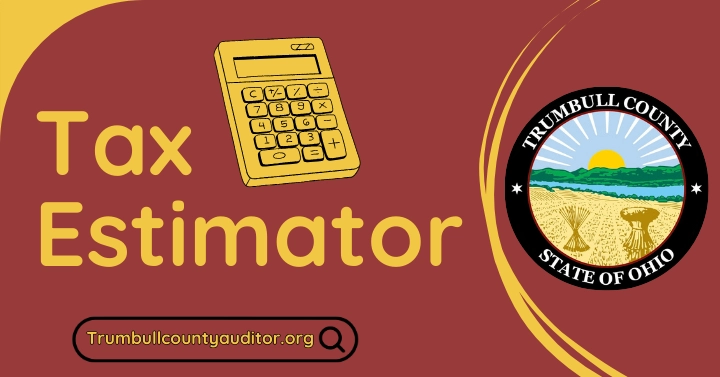Estimating property taxes in Trumbull County is easy with the right tools and knowledge. Taxes are based on your property’s value and the tax rate. Knowing your property’s details helps you estimate your taxes and avoid surprises.
In this guide, we’ll share tips to accurately estimate your property taxes. We’ll use tools like the Trumbull County Auditor’s Search and understand Trumbull County real estate records.
What Are Property Taxes in Trumbull County?
Property taxes in Trumbull County are payments based on your property’s value. They fund local services like schools and police. The taxes are calculated by multiplying your property’s assessed value by the tax rate.
The Trumbull County Auditor sets your property’s assessed value. The Treasurer’s Office collects the taxes. Knowing about property taxes helps you plan your finances better.
Top Tips for Estimating Your Property Taxes in Trumbull County
1. Use the Trumbull County Auditor’s Property Search Tool
The Trumbull County Auditor property search tool is very useful. It lets you see your property’s value, characteristics, and tax history online.
Here’s how to use it:
- Visit the Trumbull County Auditor’s website.
- Select the “Property Search” option.
- Enter your address, parcel number, or owner’s name to search for your property.
- Review the property details, including the assessed value and previous tax amounts.
This tool gives you a quick look at your property’s tax status. It helps you estimate your taxes for the next year.
2. Understand the Assessed Value vs. Market Value
Many homeowners confuse assessed value with market value. In Trumbull County, the assessed value is 35% of the market value. The market value is what your home would sell for, while the assessed value is for taxes.
To estimate your taxes, do this:
- Find your home’s market value.
- Multiply it by 35% to get the assessed value.
- Multiply the assessed value by the current tax rate for your area.
For example, if your home’s market value is $200,000, the assessed value is:
$200,000 x 0.35 = $70,000 (assessed value).
3. Check the Trumbull County Auditor’s Real Estate Records
If you’re unsure about your home’s value, check the Trumbull County Auditor real estate records. They compare your property to similar ones. The records include sales history, property features, and tax amounts.
Here’s how to access them:
- Go to the Trumbull County Auditor’s website.
- Navigate to the “Real Estate Records” section.
- Search for properties similar to yours in size, location, and features.
- Compare the sale prices and tax values to estimate your property’s value.
Comparing your property to others helps you understand your assessed value. It also tells you if you should expect changes in your tax bills.
Example Property Tax Calculation in Trumbull County
| Property Market ValueAssessed Value (35% of Market Value)Local Tax Rate (%)Estimated Property Tax | |||
|---|---|---|---|
| $150,000 | $52,500 | 2.1% | $1,102.50 |
| $200,000 | $70,000 | 2.1% | $1,470 |
| $300,000 | $105,000 | 2.1% | $2,205 |
This table shows how to calculate property taxes for different home values. It uses a 2.1% local tax rate. Remember, tax rates can change by area, so check your local tax rate.
4. Take Advantage of Exemptions and Credits
Trumbull County has property tax exemptions and credits to lower your taxes. Some include:
- Homestead Exemption: This helps senior citizens and disabled homeowners by lowering their home’s taxable value.
- Owner-Occupied Credit: If you live in your home, you might get a credit that lowers your taxes.
To see if you qualify, visit the Trumbull County Auditor’s office or website for more information.
5. Monitor Trumbull County Foreclosures
Watching Trumbull County foreclosures is key to understanding property taxes. Foreclosures can lower nearby property values. This might lower your property taxes too.
You can track foreclosures by:
- Visiting the Trumbull County Sheriff’s website for foreclosure listings.
- Looking at local real estate reports for foreclosure data.
Staying updated on foreclosures helps you predict changes in your property taxes.
6. Utilize Trumbull Property Search for Quick Access to Tax Information
The Trumbull property search tool on the Trumbull County Auditor’s website is great for finding tax info. It’s useful for both new and current homeowners. You can check your tax status and payment history easily.
7. Consider Property Improvements
Improvements to your property can change your taxes. Big upgrades, like a new room or garage, can raise your home’s value. This might increase your property taxes.
For example, a $20,000 deck increase adds $7,000 to your assessed value. With a 2.1% tax rate, this could add a few hundred dollars to your taxes each year.
Factors That Influence Property Taxes in Trumbull County
| Factor | Effect on Property Taxes | Example Impact on $200,000 Market Value Home |
|---|---|---|
| Property Improvements | Increases tax liability | Adding a $20,000 addition increases taxes by approx. $300/year |
| Foreclosures in the Area | May decrease tax liability | Nearby foreclosures lower surrounding property values |
| Changes in Local Tax Rates | Increases or decreases taxes | A 0.1% increase in tax rate could add $70 to annual tax bill |
| Tax Exemptions and Credits | Reduces tax liability | Homestead Exemption could reduce taxes by $200 or more |
8. Review Your Property Tax Bill Annually
Every year, property owners in Trumbull County get a tax bill. It shows how much they owe and any changes in value. It’s important to check this bill for mistakes.
If you find an error, you can appeal the value to the Trumbull County Board of Revision. The deadline to appeal is usually in March. But, check the Auditor’s website for the exact date.
9. Stay Informed About Changes in Trumbull County Tax Policies
Tax policies and rates can change. It’s important to know about any updates in Trumbull County. You can:
- Attend local government meetings.
- Sign up for newsletters from the Auditor’s Office.
- Follow local news for tax announcements.
Conclusion
Estimating property taxes in Trumbull County is easier than you think. Use tools like the Trumbull County Auditor property search. Understand the difference between assessed and market values. And stay updated on local tax policies.
Staying informed is key to accurate tax estimates. Use resources like Trumbull County real estate records and property search tools. By following these tips, you’ll know your tax responsibilities well.



